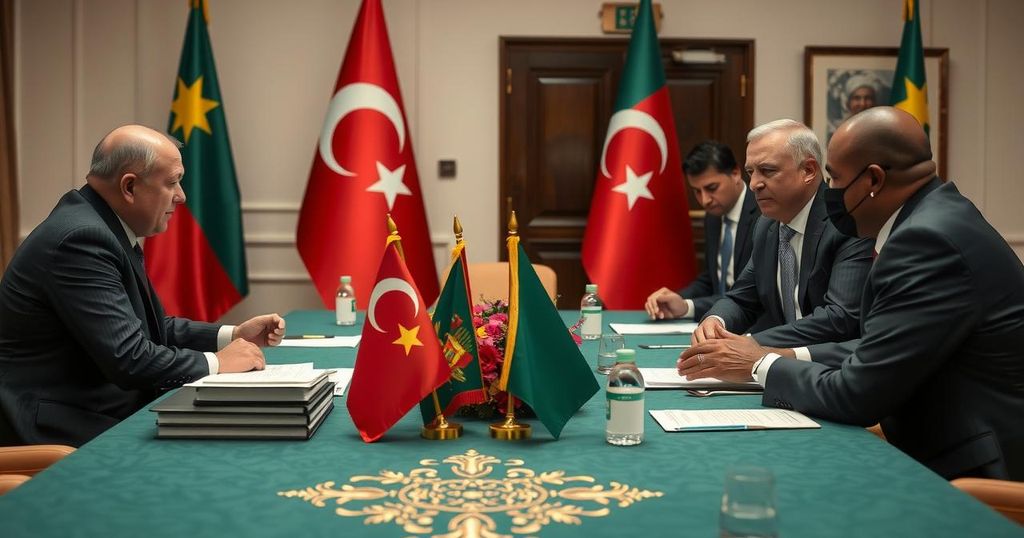Erdogan’s Diplomatic Efforts Amid Somaliland Dispute: Meetings with Somalia and Ethiopia Leaders

Turkish President Tayyip Erdogan met separately with Somalia’s President Hassan Sheikh Mohamud and Ethiopia’s Prime Minister Abiy Ahmed to discuss tensions over the Somaliland region. The talks aimed to bolster bilateral relations and pave the way for renewed negotiations, following a previous cancellation of discussions. Ethiopia’s plans for port development in Somaliland have escalated tensions, drawing Somalia closer to Egypt and Eritrea while highlighting Turkey’s increasing role in East African diplomacy.
On Wednesday, Turkish President Tayyip Erdogan conducted separate discussions with Somalia’s President Hassan Sheikh Mohamud and Ethiopia’s Prime Minister Abiy Ahmed in Ankara. These meetings aim to address the ongoing tensions between the two nations regarding the contested Somaliland region. Following these bilateral talks, Erdogan and Mohamud focused on enhancing collaborative efforts and advancing negotiations mediated by Turkey. Notably, discussions surrounding a third round of dialogues, initially scheduled for September, were previously canceled, further emphasizing the fraught relations between Somalia and Ethiopia.
The backdrop of this diplomatic engagement stems from a significant disagreement that emerged earlier in the year. Ethiopia’s announcement of plans to construct a port within Somaliland, a region that has sought independence since 1991, has provoked Somalia’s staunch opposition. Ethiopia’s recognition of Somaliland’s independence is contingent upon securing a crucial land corridor, which highlights the strategic dimensions of this conflict. This dispute has inadvertently strengthened Somalia’s ties with Egypt and Eritrea, both of which have contentious relationships with Ethiopia.
Turkey, positioned as a mediator, has been facilitating dialogue between these East African neighbors. The Turkish government has initiated two rounds of talks thus far and continues to support the Somali government by training its security forces and promoting economic development. This diplomatic initiative underscores Turkey’s broader strategy to enhance its geopolitical influence in the region, particularly given the strategic importance of the shipping lanes near the Horn of Africa.
The Horn of Africa is a volatile region, where historical disputes and geopolitical interests frequently lead to tensions among neighboring countries. Somaliland, having unilaterally declared its independence from Somalia in 1991, lacks widespread international recognition, yet claims relative autonomy and stability compared to the rest of Somalia. Ethiopia’s involvement stems from its need for access to maritime routes, as it is a landlocked nation dependent on its neighbors for trade. Turkey’s role as a mediator reflects its growing influence in Africa, where it aims to foster stability and promote development, strengthening its relationships with both Ethiopia and Somalia while navigating their competing interests.
In conclusion, the recent meetings between President Erdogan and the leaders of Somalia and Ethiopia highlight the complexities of the territorial and political disputes in the Horn of Africa. As Turkey acts as a mediator in this sensitive context, the situation remains precarious, underscoring the need for continued dialogue and cooperation to address underlying conflicts. The evolving dynamics in the region will be pivotal in shaping future relations among these countries, particularly concerning the status of Somaliland.
Original Source: www.usnews.com








